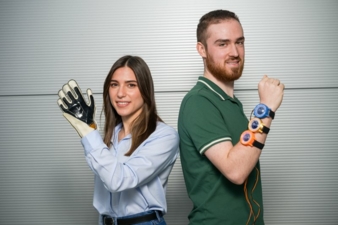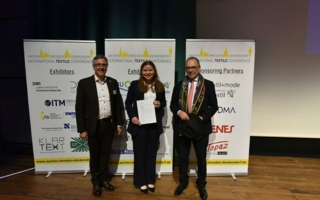09/04/2024 – Virtual skin contact
Smart textiles are making remote hugs tangible
The team led by Professors Stefan Seelecke and Paul Motzki from Saarland University is presenting an innovative technology at the Hannover Messe, which makes it possible to feel touch in virtual reality. With the help of wafer-thin silicone films that can transmit touch sensations, smart textiles are intended to create a kind of second skin.
These are intended in particular for seriously ill children in isolation wards, who can use these textiles to experience the physical closeness of their parents during computer-simulated visits: They are designed to transmit their stroking in a tangible way. Touch plays an important role in well-being and bonding between people. However, such sensations are not present in conventional video conferences. The research team is therefore working on an interdisciplinary solution that makes it possible not only to see and hear touch, but also to feel it. “Multi-Immerse” is intended to enable comprehensive sensory perception in virtual reality.
The key components of this technology are the dielectric elastomers that act as sensors and actuators. Using conductive electrode layers, they can detect and record touch and then transfer it to other textiles. This transfer is carried out by intelligent algorithms that can predict and programme motion sequences.
Various applications will be demonstrated at the Hannover Messe, including a watch with a smart film that can transmit touch. This technology should not only be energy-efficient and noiseless, but also be used in other areas such as computer games or Industry 4.0. For example, work gloves can be equipped with these films to make the operation of machines more intuitive and user-friendly.
To summarise, the technology with smart textiles enables an immersive experience in virtual reality by making touch tangible. The interaction of different specialism creates a holistic sensory experience that can be of great benefit, particularly for isolated patients and in many other areas of application.
Scientific contact persons:
Prof. Dr. Stefan Seelecke, Lehrstuhl für intelligente Materialsysteme +49 (681) 302-71341; stefan.seelecke@imsl.uni-saarland.de
Prof. Dr. Paul Motzki, Professur Smarte Materialsysteme für innovative Produktion, +49 (681) 85787-545; paul.motzki@uni-saarland.de




